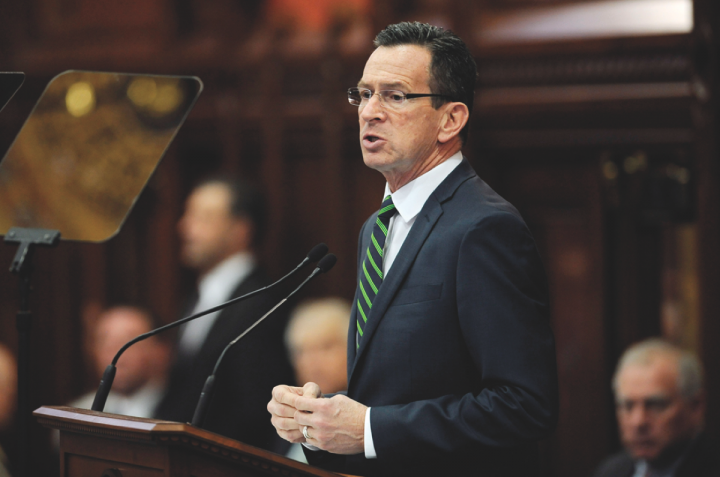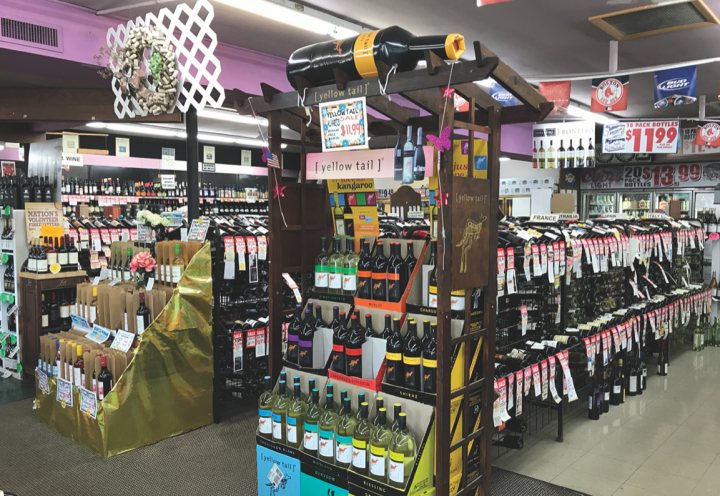
Earlier this year, many independent retailers in Connecticut breathed a sigh of relief. A key battle—a lawsuit against the state’s minimum pricing rules—was dismissed by the U.S. District Court of Connecticut. But the relief may be short-lived, as the decision is being appealed.
That battle is one of several around the country that pits independent retailers against larger regional and national chains. Issues—including minimum pricing, Sunday sales, and grocery and c-store sales of wines and spirits—are playing out at the statewide level around the country.
In Connecticut, the rules currently in place are crucial to the independents’ survival. “I’m fortunate in that my store is doing well, but I’m working with a group of retailers to try and stem the onslaught of big box stores,” says Patrick Monteleone, owner and wine specialist at Harry’s Wine & Liquor Market in Fairfield, Connecticut. “I know there are a lot of guys just hanging on right now—too many of them.”
Restrictive Landscape

By many state standards, Connecticut’s laws governing beverage alcohol are fairly restrictive. The issue currently at the fore: the minimum pricing requirement that mandates retailers sell their products at a minimum price above wholesale cost. The law also prevents distributors from offering volume discounts to retailers.
In the minimum pricing lawsuit, national chain Total Wine & More argued that the current structure prevents it from using its efficiencies to reduce prices for consumers. However, Chief U.S. District Judge for the District of Connecticut Janet C. Hall ruled against Total Wine in June, concluding that the law cannot be preempted by federal anti-trust laws prohibiting activities that restrict competition.
Other Connecticut laws are also restrictive in comparison to many other states. Sales of wine and spirits are prohibited in grocery and convenience stores, although beer can be sold in those channels. The law also prevents out-of-state retailers from shipping wine directly to consumers. But there has been some liberalization. The state began allowing sales of beverage alcohol on Sundays in 2012, and it extended sales hours in 2015.
Many independent retailers argue that the current system works well. “People make it sound like our model in Connecticut is really outdated, but I think it’s the best model in the country,” says Stephen Downes, co-owner of CT Beverage Mart, which has four locations in the state. “We have package stores that have great selection. If you go to a quantity discount model, selection is going to change and go away. The top 50 items might be cheaper, and you can use them as loss leaders, but then you might lose selection because everybody is going to be buying quantity to try and get the cheaper price.”
Downes also argues that more remote retailers will be hurt disproportionately. “If you go to a quantity discount model, the populated areas along I-95 and I-91 might get cheaper prices, but the rest of the state will get more expensive prices,” he says. “If you’re in a small town and you have quantity discounts, prices will go up and you’ll get worse selection,” because smaller retailers won’t have the buying power to make volume purchases.
Caroll Hughes, executive director of the Connecticut Package Stores Association (CPSA), adds that the current pricing structure allows more brands to thrive. With between 1,100 and 1,200 beverage alcohol retailers in the state, “they have the ability to get into a lot of stores, and with the minimum bottle structure, everybody can effectively sell almost every product,” he says. The nature of the product involved is also relevant, says Monteleone of Harry’s, noting that one aspect of the challenge that seems to get lost is that alcoholic beverages, as controlled substances, require a different approach than selling paper towels or Coca-Cola. “Part of the conversation needs to be that this is a controlled substance, and these guys want to drive pricing down on that,” he says. “I have a responsibility to my community to ensure this controlled substance is handled properly. It’s not all about selling as many cases as you can at the cheapest prices.”

Governor's Support
Total Wine & More, which has four stores in Connecticut, did not respond to a request for comment on minimum pricing rules. Neither did Stamford-based BevMax, which operates 11 stores in Connecticut and sided with Total Wine on the issue. According to published reports, Total Wine advertised and sold alcoholic beverages at below the legal minimum in summer 2016. Shortly thereafter, BevMax announced it would follow suit. On September 1st, 2016, Total Wine reportedly agreed to pay a $37,500 fine for its infraction.
The lawsuit followed, and while Total Wine didn’t prevail, the issue is unlikely to go away. Some retailers say they expect the issue to resurface in the state legislature next year. Liberalization has the support of Connecticut Governor Dannel Malloy, who earlier this year tried to push a bill through the state legislature that would have eliminated Connecticut’s minimum pricing requirements. “Connecticut is the only state in the country with a law mandating that the retailers of alcoholic beverages sell their products at a minimum price above wholesale cost determined by the wholesaler industry,” Malloy said in a statement earlier this year, when he submitted a liberalization proposal to the legislature. “This means that—unlike everywhere else in the nation—these retailers cannot set the prices of the products they put on the shelves in their own stores.” Malloy added that “the artificially determined prices typically end up being higher than the prices that these products sell for in nearly every other state in the country, forcing Connecticut residents to either pay more money or travel to a bordering state where the identical products are sold at a lower price.”

While Malloy’s effort ultimately died, many retailers expect to see something similar in the next legislative session. And some argue that it is broader Connecticut laws, not only those specific to alcoholic beverages, that are hurting the state’s retailers. “We’re trying to show that things that the governor has done have actually caused our prices to rise,” says Paul Agranovich, co-owner of CT Beverage Mart. “Our contention all along has been that if we step back on some of the things the governor has done—such as raising the excise tax by 20 percent, causing bottles of liquor to go up by $1 or more—prices would come down.”
Alan Wilensky, owner of Max’s Package Store in East Lyme, Connecticut, says the state is unfriendly to small businesses. “Like any business in the state of Connecticut, we’re faced with the challenges of the state of Connecticut,” Wilensky says. “Personally we had a good year, but it’s been a long time coming back. Business taxation is always a problem—the pure overhead costs that suck money out of the economy and out of the businesses in the state.” He adds that the environment is negatively impacting his business and others.
Monteleone of Harry’s also suggests that the “mom and pop” nature of the business in Connecticut will be threatened if laws are changed. “One of the last vestiges of anchor stores are mom-and-pop retail wine and liquor stores,” he says. “People want to spend their money locally, and they want to get a better quality product. When they come to my store, they want somebody they can talk to about their personal tastes. I’d hate to see these 1,200 or so mom-and-pop stores get run out, only to find out a few years down the road that we made a mistake. We’ve got a really healthy market. People aren’t coming into our stores and complaining about pricing. That’s stuff they’re doing in the media.”

Looking Ahead
Independent retailers in Connecticut fully expect the minimum pricing issue and others to come back again, either in the courts or in the legislature.
Regarding minimum pricing, Hughes of the CPSA says “they’ve had a challenge going on for at least four years now, and they’ve lost every year, but I certainly expect it to come up again.”
In fact, retailers say the push for change has been consistent year after year for the past five years or so, when the state’s law changed to allow Sunday sales. Smaller retailers lost that hard-fought battle. “We’ve adapted, but it was something we really didn’t want to get involved with,” says Agranovich of CT Beverage Mart. “Though our business is definitely up, Saturday night business has become very average where we used to have lines to the back of the store. While they’re here to stay, Sunday sales were put in to raise money through higher sales, and that has absolutely not materialized.”
Next up, retailers say, could be legalizing shipments of wine to residents from out-of-state retailers, or expansion of private labels, both of which came up in bills introduced during the last legislative session. “This year we had bills that would have allowed the private labels of Total Wine to be made available to other retailers,” Hughes noted. “It passed out of committee unanimously, but it died along with hundreds of other bills on the closing day of the general assembly.”
That’s something the industry can get behind. Smaller retailers see a threat in out-of-state shipments. “With 1,150 stores I think we have enough competition,” Hughes notes. CT Beverage Mart’s Downes likens it to out-of-state retailers “stealing business,” and says the wine coming in from outside the state would result in higher operating costs for in-state retailers. “We think we have a pretty good selection and we think those products should go through our stores,” he says.
In fact, Downes would be happiest if things were left as-is. “Most of the stores in Connecticut like the laws right now,” he says. “We have great selection and we have a lot of small distributors that you don’t get in many other states. If you change the model, a lot of those could go away. You have to look at the whole thing, and that’s why the legislature hasn’t made any changes.”